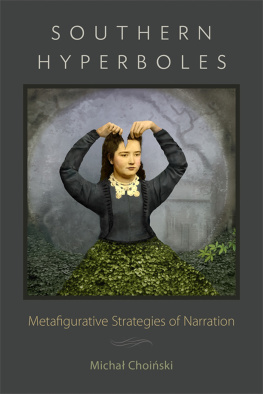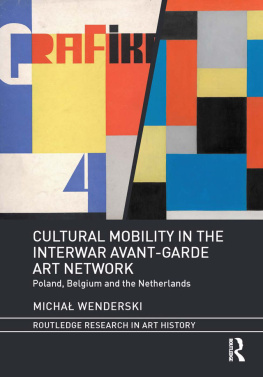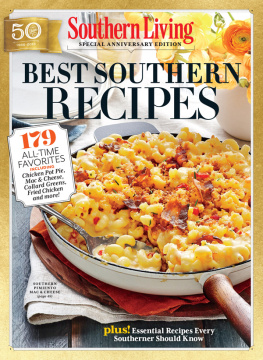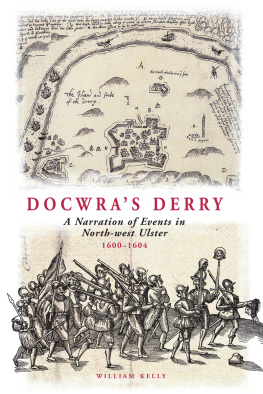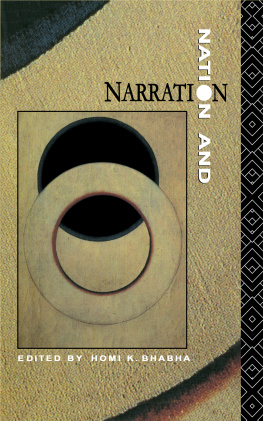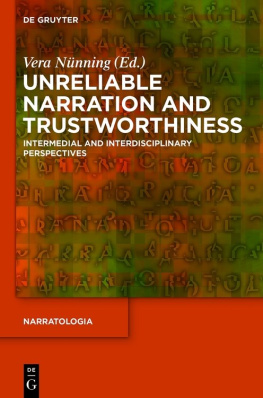Michał Choiński - Southern Hyperboles: Metafigurative Strategies of Narration
Here you can read online Michał Choiński - Southern Hyperboles: Metafigurative Strategies of Narration full text of the book (entire story) in english for free. Download pdf and epub, get meaning, cover and reviews about this ebook. year: 2020, publisher: LSU Press, genre: Romance novel. Description of the work, (preface) as well as reviews are available. Best literature library LitArk.com created for fans of good reading and offers a wide selection of genres:
Romance novel
Science fiction
Adventure
Detective
Science
History
Home and family
Prose
Art
Politics
Computer
Non-fiction
Religion
Business
Children
Humor
Choose a favorite category and find really read worthwhile books. Enjoy immersion in the world of imagination, feel the emotions of the characters or learn something new for yourself, make an fascinating discovery.
- Book:Southern Hyperboles: Metafigurative Strategies of Narration
- Author:
- Publisher:LSU Press
- Genre:
- Year:2020
- Rating:3 / 5
- Favourites:Add to favourites
- Your mark:
- 60
- 1
- 2
- 3
- 4
- 5
Southern Hyperboles: Metafigurative Strategies of Narration: summary, description and annotation
We offer to read an annotation, description, summary or preface (depends on what the author of the book "Southern Hyperboles: Metafigurative Strategies of Narration" wrote himself). If you haven't found the necessary information about the book — write in the comments, we will try to find it.
Southern Hyperboles: Metafigurative Strategies of Narration — read online for free the complete book (whole text) full work
Below is the text of the book, divided by pages. System saving the place of the last page read, allows you to conveniently read the book "Southern Hyperboles: Metafigurative Strategies of Narration" online for free, without having to search again every time where you left off. Put a bookmark, and you can go to the page where you finished reading at any time.
Font size:
Interval:
Bookmark:

Southern Literary Studies
Scott Romine, Series Editor
Metafigurative Strategies of Narration

Micha Choiski

LOUISIANA STATE UNIVERSITY PRESS
BATON ROUGE
Published by Louisiana State University Press
Copyright 2020 by Louisiana State University Press
All rights reserved
First printing
Designer: Laura Roubique Gleason
Typeface: Minion Pro
Library of Congress Cataloging-in-Publication Data
Names: Choiski, Micha, 1983 author.
Title: Southern hyperboles : metafigurative strategies of narration / Micha Choiski.
Description: Baton Rouge : Louisiana State University Press, 2020. | Series: Southern literary studies | Includes bibliographical references and index.
Identifiers: LCCN 2019050596 (print) | LCCN 2019050597 (ebook) | ISBN 978-0-8071-7298-8 (cloth) | ISBN 978-0-8071-7379-4 (pdf) | ISBN 978-0-8071-7380-0 (epub)
Subjects: LCSH: American literatureSouthern StatesHistory and criticism. | American literature20th centuryHistory and criticism. | Hyperbole in literature.
Classification: LCC PS261 .C47 2020 (print) | LCC PS261 (ebook) | DDC 810.9/8975dc23
LC record available at https://lccn.loc.gov/2019050596
LC ebook record available at https://lccn.loc.gov/2019050597
The paper in this book meets the guidelines for permanence and durability of the Committee on Production Guidelines for Book Longevity of the Council on Library Resources. 
To my parents
Figurative Modes of Cognition
Katherine Anne Porter
William Faulkner
Lillian Smith and Katharine Du Pre Lumpkin
Tennessee Williams
Flannery OConnor
Harper Lee
This book has been a labor of love for the last six years. During that time, I have been fortunate enough to receive support and assistance from a number of people to whom I feel deeply indebted.
First, I would like to thank Robert Brinkmeyer Jr., who first introduced me to Lillian Smith and Katherine Anne Porter, and with whom every conversation quickly turned into a laboratory for new ideas about American culture and literature. The genesis and completion of this book would not have been possible without those illuminating conversations.
I am deeply grateful to Marta Gibiska-Marzec, who first taught me rhetoric and Shakespeares drama during my undergraduate studies at the Jagiellonian University and who has offered me astute guidance on how to read literature ever since. Her insightful suggestions regarding the content and the organization of the manuscript have been invaluable.
I wish to thank Elbieta Chrzanowska-Kluczewska, head of the Institute of English Studies at the Jagiellonian University, for her excellent advice on how to develop the figurative methodology used in this study and how to organize the methodological chapter of the book. Her expertise on the figurative aspects of language is unsurpassed.
Zygmunt Mazur, head of the Department of American Literature and Culture at the Institute of English Studies, remained invariably supportive and understanding over these six long years, always doing his best to facilitate the writing process. I am grateful for his help and encouragement.
Nancy Schultz from Salem State University and Aeddan Shaw, my colleague from the Institute of English Studies, were kind enough to provide me with insightful comments on the manuscript of Southern Hyperboles. I am deeply grateful for their feedback and for saving me from the embarrassment of a number of silly typos. Needless to say, any mistakes which may remain are my responsibility.
I wish to thank my colleagues and friends Magorzata Cierpisz, Maciej Eder, Jeremiasz Jagiea, Alicja Kowalczewska, Urszula Niewidomska-Flis, and Jan Rybicki for their tireless support and kind words of encouragement, especially when the final stages of my work on the manuscript became a time of personal struggle.
The book also would not have been possible were it not for the OPUS research grant awarded by the Polish National Science Centre (OPUS 2016/23/B/ HS2/01207, Hyperbole in the Writings of American Southern Authors). The funds provided by the grant allowed me to travel to libraries and research centers outside of Poland and to participate in a number of academic conferences between 2017 and 2020. I am deeply grateful to the Polish National Science Centre for sponsoring my research.
Over these six years, I was lucky enough to enjoy the hospitality of a number of academic institutions, which kindly allowed me to use not only the excellent resources of their libraries but also comfortable desks where I could pile up my carefully hoarded books: the John F. Kennedy Institute at Freie Universitt, Berlin; the Jonathan Edwards Center at Yale University; and the Institute of Southern Studies at the University of South Carolina. It was a delight to be able to work in those libraries, and the oases of tranquillity that they afforded played a large part in seeing this project come to fruition.
Last, but not least, I wish to thank my parents, Janusz Choiski and Krystyna Choiska, for their unquestionable and loving support. They have always encouraged me to reflect on the surrounding worldI remain grateful for that lesson. This book is dedicated to them.
SOUTHERN HYPERBOLES
This book springs from my enduring fascination with the literature of the American South. Ever since I started teaching southern fiction almost a decade ago, I have been increasingly preoccupied with its distinctiveness as well as with what one of my students once described as southern exotic rhetoric. Certainly, part of my growing interest was connected to my own regional background. I was brought up in Galicia, in the southern part of Poland, which is notorious for its dedication to social propriety and religious traditions and a propensity for nostalgic mythmaking, especially in the context of Polands troubled history. Thus, I have felt an understandable affinity with the tensions rooted in the literature of the American South. And I wanted to learn more, particularly in terms of understanding the language principles behind the southernness I intuitively saw in the various texts I so much enjoyed teaching.
In this context, I cannot resist evoking a well-known analogy from Sophies Choice, by William Styron:
Poland is a beautiful, heart-wrenching, soul-split country which in many ways [] resembles or conjures up images of the American Southor at least the South of other, not-so-distant times. It is not alone that forlornly lovely, nostalgic landscape which creates the frequent likenessthe quagmiry but haunting monochrome of the Narew River swampland, for example, with its look and feel of a murky savanna on the Carolina coast, or the Sunday hush on a muddy back street in a village of Galicia, where by only the smallest eyewink of the imagination one might see whisked to a lonesome crossroads hamlet in Arkansas these ramshackle, weather-bleached little houses, crookedly carpentered, set upon shrub less plots of clay where scrawny chickens fuss and peck. (246247)
Font size:
Interval:
Bookmark:
Similar books «Southern Hyperboles: Metafigurative Strategies of Narration»
Look at similar books to Southern Hyperboles: Metafigurative Strategies of Narration. We have selected literature similar in name and meaning in the hope of providing readers with more options to find new, interesting, not yet read works.
Discussion, reviews of the book Southern Hyperboles: Metafigurative Strategies of Narration and just readers' own opinions. Leave your comments, write what you think about the work, its meaning or the main characters. Specify what exactly you liked and what you didn't like, and why you think so.

